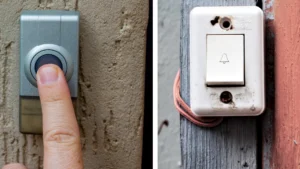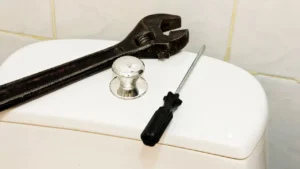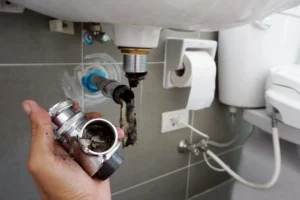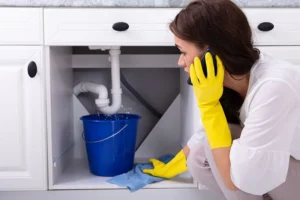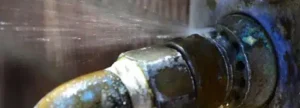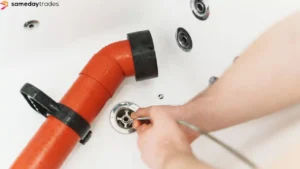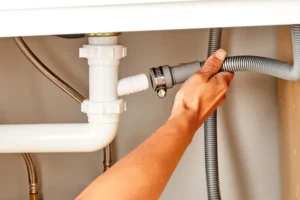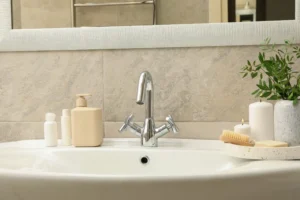Have you ever experienced a clogged drain or a dripping faucet at your home? Well, you are not alone. In Australia, such plumbing problems increase the demand for various kinds of plumbing systems.
This article will help you to get in touch with the best possible options as it guides you through every available possibility and you should be able to make informed decisions when it comes to your plumbing needs.
What is Plumbing?
Plumbing is about the pipes and taps in your house that bring water in and take waste out. It’s a system that keeps our homes running smoothly, letting us use water whenever we need it.
Definition
Plumbing involves moving water into and out of buildings, which is done through an important system made up of pipes, faucets, valves, fittings, drainage apparatus, and other devices that help in the consumption of clean water for various purposes – like drinking, heating, washing or waste management.
Plumbing is an important system responsible for piping water into homes and businesses and frequently seen at the back or underneath the property. There are many ways drains can be fitted into spaces but the most common type includes two separate pipes that will connect together. The system is to be designed in a way to help provide people with good health, safety, and comfort.
Different types of plumbing
Plumbing plays a vital role in every house and building. It ensures water comes in and goes out properly. Here’s a look at different types of plumbing you might find interesting.
– Residential plumbing is all about homes and small apartments. This kind involves fixing pipes, toilets, sinks, and showers that families use every day.
– Commercial plumbing deals with bigger places like schools, large buildings, and businesses. These plumbers work on complex systems and need to know a lot about codes and regulations.
– Service and repair plumbers are the heroes who come to fix leaks or blocked drains. They’re skilled in finding problems fast and fixing them so everything works smoothly again.
– Water supply plumbers focus on the journey of clean water into your home. From the main pipes in the street to your taps at home, they make sure you always have access to fresh water.
– Sanitary plumbers take care of removing waste water from your property. They work on sewers and drain lines to keep them flowing well, preventing any back-up in your home.
Types of Plumbers
In the plumbing world, many kinds of plumbers are out there. Each one has a special job – fixing homes, big buildings, or working on pipes that give us water or take away waste.
Residential plumber
If you have any plumbing issues, contact a residential plumber. Residential plumbers are responsible for handling water issues in homes, regardless of the problem. Buttons, pipes, or even the bathroom are certainly the work of these pros.
The installation of toilets buttons then taps, Residential Plumber is about maintaining a safe and secure premises and creating a cozy environment for residents. They are there to fix any leaks (pipe bursts) in your area or if you need a new hot water system installed.
Commercial plumber
A commercial plumber finds their working environment in business complexes, shopping malls, schools, hospitals, and business houses. The ones who deal with more intricate systems, meaning you get wider pipes, industrial kind of fixtures, or tools that are more suitable for extensive usage.
Their work is not just restricted to stopping the leakage; they create and implement the systems best suited to the requirements of the companies. The plumbing work, type of pipes, and fixtures need to be approved by following the codes and standards for plumbing.
So, next time you’re in a large complex and everything seems to be flowing nicely, there might just be a commercial plumber behind the scenes making it all happen.
Service and repair plumber
A service and repair plumber is someone you call for help with your taps, toilets, and sinks. They fix leaks, unblock pipes, and replace old plumbing parts that don’t work well anymore.
Think of them as the doctors for your home’s water system. These plumbers are handy because they know a lot about different types of problems in houses or apartments. They can quickly figure out what’s wrong and how to fix it.
This kind of plumber works on jobs big and small all around the clock. If a pipe bursts in the middle of the night or your hot water stops working just before breakfast, they’re the ones who come to save the day.
Their job is all about making sure everything flows smoothly in your home so you can get back to normal life fast.
Water supply plumber
Water supply plumbers specializes on the pipes that convey water, clean water into your home. They use pipes to convey water for use in taps, showers as well as in appliances and they deal with the installment, repair and maintenance of same. Consider something as simple as patching or as complex as pipe replacement.
Such a plumber ensures that there is availability of safe water for drinking and the water you use for preparing food and cleaning.
They also engage in exterior installations such as fitting of water tanks to your house water supply system. For those people who have problems with low water pressure, or to replace the plumbing system as part of the home renovation.
Sanitary plumber
Sanitary plumbers focus on jobs related to your home’s sewage systems. They install, fix, and maintain pipes that take away waste water from homes. This includes toilets, drains, and sinks.
Their job is essential for keeping our homes clean and hygienic.
They also work on stormwater plumbing which involves managing rainwater runoff. This makes sure that water does not build up around houses during heavy rains. Sanitary plumbers play a key role in ensuring our environment stays healthy by preventing waste water from mixing with natural water bodies.
Construction plumber
Moving from the indoors out, we shift focus to construction plumbers. These tradespeople are key players on building sites. They work with blueprints and follow strict codes to install plumbing systems in new buildings, extensions, and renovations.
Their role involves laying pipes for water supply, setting up systems for waste removal, and ensuring that all installations meet health and safety standards.
A construction plumber’s job starts long before the first pipe is laid. They collaborate closely with architects and builders to plan efficient plumbing solutions that align with a structure’s design.
From residential homes to towering commercial structures, they make sure that tap water flows properly and toilets flush smoothly without any hitches. Their expertise ensures our buildings are safe, comfortable places to live and work in.
Different Types of Plumbing Systems
Plumbing systems keep our homes running smoothly, from clean water to getting rid of waste. Three key types make sure we’re comfy and safe – like bringing fresh water in, taking rainwater away, and dealing with sewage.
Potable plumbing system
A potable plumbing system is all about clean water. This system brings water into your home and makes sure it’s safe to drink, cook with, and bathe in. Pipes made from copper, PVC (polyvinyl chloride), or PEX (cross-linked polyethylene) are common.
Towns add treatments to this water so it meets health standards.
This setup also involves a network of pipes inside your walls. They connect to taps, showers, and appliances like washing machines. Regular checks ensure no leaks and the water stays clean on its way to you.
Sanitary plumbing system
Sanitary plumbing systems take care of all the waste from your bathroom, kitchen, and laundry. They make sure that dirty water goes away to sewage plants safely. Pipes in this system are big enough so they don’t block easily.
They also keep gases and smells out of your house. It’s a smart set-up that needs right fitting and regular checks.
Fixing these systems takes special skills. Plumbers who work on them know how to install, fix, and maintain pipes well. They ensure everything works smoothly so health risks stay low.
This kind of plumbing is essential for keeping homes clean and safe from germs.
Stormwater plumbing system
A stormwater plumbing system takes care of rainwater from your roof, driveways, and other outdoor areas. Its job is to move this water away from your home quickly to stop floods. The system uses pipes, gutters, and drains to do this.
It’s about more than just getting rid of the water. A good stormwater system can also help reuse this water for gardens or washing cars, making it a smart choice for saving water.
This type of plumbing plays a big role in keeping our local rivers and beaches clean as well. By managing how rainwater flows through our cities and towns, it helps prevent pollution from reaching natural waterways.
How to Choose the Right Plumber for Your Needs
Choosing the right plumber means thinking about what you need fixed and making sure they have the right skills. Want to learn more? Keep reading!
Factors to consider
Choosing the right plumber for your needs involves more than just picking a name from a list. You need to think about several things to ensure you get quality work and reliable service. Here’s what you should consider:
– Experience counts a lot in plumbing. Look for someone who has been working in the field for years. They will have seen many different issues and know how to fix them.
– Make sure the plumber is licensed. In Australia, plumbers need to be licensed to work legally. This means they have met certain training standards.
– Check if they are insured. If something goes wrong, insurance will cover damages caused by the plumber.
– Availability is crucial, especially if you have an emergency. Some plumbers offer 24/7 services.
– Ask about their rates upfront. You don’t want any surprises when it comes time to pay.
– Read reviews from other customers. This gives you an idea of their reputation and the quality of their work.
– Find out if they guarantee their work with a warranty. It shows they stand behind their service.
– It helps to ask friends or family for recommendations. They can tell you about plumbers they’ve used and trusted.
Thinking through these points helps pick a plumber who’ll do good work at fair prices while also giving peace of mind throughout the process.
Importance of a licensed plumber
After considering what to look for in a plumber, the next crucial step is ensuring they are licensed. A licensed plumber has the right skills and knowledge to tackle your plumbing needs safely and effectively.
They have passed tests to show they know their craft well. This is key because plumbing work can affect your home’s water quality and safety.
Hiring someone with a license means you get a professional who follows the latest health and safety standards. They can fix problems without causing harm or breaking laws. For peace of mind, always check that your plumber is properly licensed before starting any job.
This way, you protect yourself from poor workmanship that could cost more in repairs later on.
Common plumbing issues
Plumbing problems can pop up unexpectedly and cause a lot of hassle. They range from minor issues to ones that need immediate attention. Here’s a list of common plumbing issues many people face:
– Dripping taps waste water and can increase your bill.
– Slow draining sink happens due to blockages from food or hair.
– Clogged bath or shower drain is often caused by hair and soap build-up.
– Leaky pipes can damage your home and lead to higher water bills.
– Running toilets use too much water, increasing costs.
– Faulty water heater means no hot showers until it’s fixed.
– Low water pressure makes showering and washing difficult.
– Sewer system backup is a big problem, causing smells and mess in your home.
Each issue might seem small but can lead to bigger problems if not fixed quickly.
Tips for maintaining a plumbing system
Taking care of your plumbing system ensures it runs smoothly and saves you from costly repairs. Regular maintenance can keep your pipes in top shape and prevent common problems. Here’s how you can maintain your plumbing system:
– Always watch what goes down the drain. Avoid pouring grease, oils, and food scraps into your kitchen sink as they can clog the pipes.
– Use a strainer over drains in showers and basins to catch hair and soap pieces which might block the water flow.
– Make it a habit to check for leaks in taps and under sinks regularly. Even a small drip can waste loads of water and lead to bigger issues.
– Inspect toilet flushes for any signs of leakage or constant running water, as this could point to a faulty valve.
– Only flush toilet paper down the toilet; other items like wipes or sanitary products should be disposed of in a bin.
– Keep an eye on water pressure around your house. Too much pressure can strain pipes and lead to leaks.
– Learn how to shut off your home’s main water supply in case of emergencies like a major leak or burst pipe.
– During winter, insulate exposed pipes to prevent them from freezing and possibly bursting when temperatures drop.
– Install a water softener if you’re in an area with hard water as mineral buildup can clog pipes over time.
Following these steps will help ensure that your plumbing system is reliable, preventing unexpected problems and extending its lifespan.
Conclusion
Plumbing systems play a big role in our daily lives. They bring us clean water and take away waste, keeping our homes healthy. We’ve seen there are many plumbers out there, each skilled in different areas.
From fixing leaks to building new systems, they do it all. Choosing the right plumber means looking at licenses and skills for your specific problem. Keep your plumbing system running smooth with regular checks and fixes.


